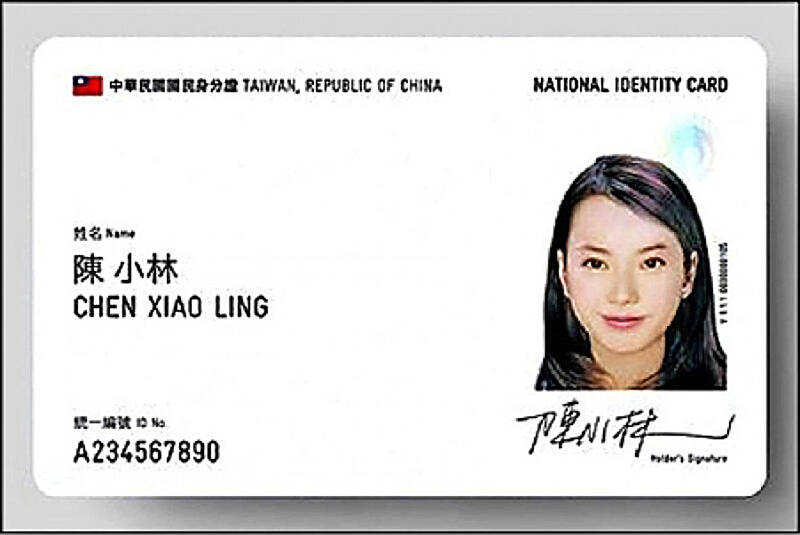The suspended digital identification card program has cost NT$202 million (US$6.27 million) in public spending, as a budget item was renewed semi-annually from January 2021 to December last year, the Central Engraving and Printing Plant said.
Officials from the mint made the comment to lawmakers in the digital ID distribution and budget utilization task force under the Legislative Yuan’s Internal Administration Committee on Wednesday.
In June 2019, the mint began preparations to manufacture digital ID cards containing chips under the Executive Yuan’s directive, aiming to replace existing cards in two years, they said.

Photo: screen grab from the Ministry of the Interior’s Web site
The agency in February 2020 signed a contract with Teco Electric and Machinery Co for card-making equipment, which was delivered in December that year, the mint said.
The factory and equipment were already ready when the Executive Yuan on January 2021 halted the project due to unresolved information security issues, they said.
Teco, which had already supplied the equipment, sued the mint for the income the chip factory would have generated, the mint said, adding that the case was settled out of court.
The settlement stipulated that the government would pay for the project’s overheads, including equipment maintenance and replacement, personnel costs and utility bills, they said.
The building features assembly lines, quality control stations, packaging areas, administrative offices, computer rooms and storage space for semi-finished and finished cards, officials said.
Access-controlled gates and cameras were installed to protect personal data from being leaked and the product’s integrity, they said, adding that personnel would be under full surveillance.
The factory’s internal network is air-gapped and makes use of a point-to-point tunneling protocol to enhance security, they said.

Taiwan has received more than US$70 million in royalties as of the end of last year from developing the F-16V jet as countries worldwide purchase or upgrade to this popular model, government and military officials said on Saturday. Taiwan funded the development of the F-16V jet and ended up the sole investor as other countries withdrew from the program. Now the F-16V is increasingly popular and countries must pay Taiwan a percentage in royalties when they purchase new F-16V aircraft or upgrade older F-16 models. The next five years are expected to be the peak for these royalties, with Taiwan potentially earning

STAY IN YOUR LANE: As the US and Israel attack Iran, the ministry has warned China not to overstep by including Taiwanese citizens in its evacuation orders The Ministry of Foreign Affairs (MOFA) yesterday rebuked a statement by China’s embassy in Israel that it would evacuate Taiwanese holders of Chinese travel documents from Israel amid the latter’s escalating conflict with Iran. Tensions have risen across the Middle East in the wake of US and Israeli airstrikes on Iran beginning Saturday. China subsequently issued an evacuation notice for its citizens. In a news release, the Chinese embassy in Israel said holders of “Taiwan compatriot permits (台胞證)” issued to Taiwanese nationals by Chinese authorities for travel to China — could register for evacuation to Egypt. In Taipei, the ministry yesterday said Taiwan

Taiwan is awaiting official notification from the US regarding the status of the Agreement on Reciprocal Trade (ART) after the US Supreme Court ruled US President Donald Trump's global tariffs unconstitutional. Speaking to reporters before a legislative hearing today, Premier Cho Jung-tai (卓榮泰) said that Taiwan's negotiation team remains focused on ensuring that the bilateral trade deal remains intact despite the legal challenge to Trump's tariff policy. "The US has pledged to notify its trade partners once the subsequent administrative and legal processes are finalized, and that certainly includes Taiwan," Cho said when asked about opposition parties’ doubts that the ART was

If China chose to invade Taiwan tomorrow, it would only have to sever three undersea fiber-optic cable clusters to cause a data blackout, Jason Hsu (許毓仁), a senior fellow at the Hudson Institute and former Chinese Nationalist Party (KMT) legislator, told a US security panel yesterday. In a Taiwan contingency, cable disruption would be one of the earliest preinvasion actions and the signal that escalation had begun, he said, adding that Taiwan’s current cable repair capabilities are insufficient. The US-China Economic and Security Review Commission (USCC) yesterday held a hearing on US-China Competition Under the Sea, with Hsu speaking on